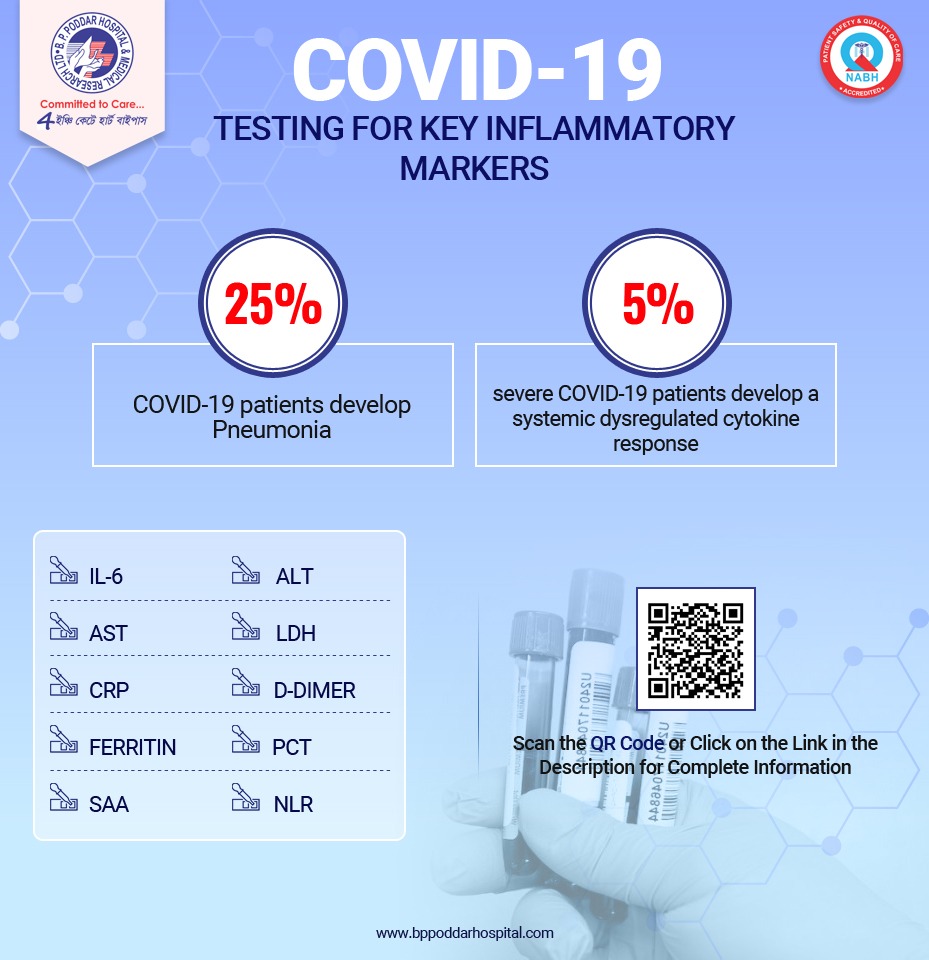
Covid-19- Testing for Key Inflammatory Markers
8 July, 2021
[cmsmasters_row][cmsmasters_column data_width="1/1"][cmsmasters_text]
The ongoing pandemic of coronavirus disease 2019 (COVID-19) poses several challenges to clinicians. Clinical assessment is indispensable, but laboratory markers, or biomarkers, can provide additional, objective information which can significantly impact these components of patient care. In this article, we will discuss 10 different markers which can give a quantitative indication about the severity and prognosis of Covid-19. It has to be noted that this is not an exhaustive list and it is up to clinician’s judgment which test/s needs to be conducted on the patient based on the history and condition. This is just for information purpose.
- IL-6: IL-6 (Interleukin 6) is a cytokine which controls the immune response in addition to cell proliferation and differentiation. IL-6 is a cytokine which has both pro- and anti-inflammatory properties. the control of the IL-6 secretion is particularly important during disease, especially their activation after immune response activation which is seen due the Cyokine Storm induced by Covid-19
- AST & ALT: AST stands for Aspartate Aminotransferase and ALT stands for Alanine Aminotransferase (ALT). Coronavirus Disease 2019 (COVID-19), due to infection with the virus termed SARS-CoV-2, has complicated the evaluation of elevated liver enzymes. Elevated liver enzymes occur in a median of 15% and up to 58% of patients with COVID-19. Though the most common patterns of liver enzyme abnormalities in patients with SARS-CoV-2 include elevated aminotransferases, with aspartate aminotransferase (AST) and alanine aminotransferase (ALT) typically 1–2 times the upper limit of normal, the prognostic significance of abnormal liver biochemistries remains uncertain. There are many potential contributing etiologies to elevated liver enzymes in patients with SARS-CoV-2 including direct liver injury, associated inflammatory responses, congestive hepatopathy, hepatic ischemia, drug-induced liver injury (DILI), and muscle breakdown
- CRP: CRP stands for C-Reactive Protein. A systemic inflammatory response is observed in coronavirus disease 2019 (COVID-19). Elevated serum levels of C-reactive protein (CRP), a marker of systemic inflammation, are associated with severe disease in bacterial or viral infections. One possible explanation for this phenomenon is the overproduction of inflammatory cytokines. Cytokines fight against the pathogen but when the system hyperactivates, it can damage lung tissue. CRP production is induced by cytokines – and by tissue destruction.
- LDH: LDH stands for Lactate Dehydrogenase. elevated LDH values were associated with 6-fold increased odds of severe COVID-19 disease. More importantly, elevated LDH was associated with a >16-fold increase in odds of mortality. As such, patients' LDH should be closely monitored for any of signs of disease progression or decompensation.
- D-Dimer: D-dimer is actually a protein fragment that uses itself soon after the degradation of a blood clot. Indeed, D-dimer is one of the most genuine biomarkers for both mortality rate and the severity of any disease. In brief, D-dimer is known as a product of cross-linked fibrin, which stays present in the blood in case of blood clotting. To be more specific, people with blood clotting disorders should mandatorily go for a D-dimer test. The necessities of this test are,
-This test can help to assess the severity of the disease.
-This test helps to easily assess the risks of pulmonary complications.
- Serum Ferritin is a key mediator of immune dysregulation, especially under extreme hyperferritinemia, via direct immune-suppressive and pro-inflammatory effects, contributing to the cytokine storm1. It has been reported that fatal outcomes by COVID-19 are accompanied by cytokine storm syndrome, thereby it has been suggested that disease severity is dependent of the cytokine storm syndrome. Many individuals with diabetes exhibit elevated Serum Ferritin levels, and it is known that they face a higher probability to experience serious complications from COVID-19.
- PCT: PCT stands for Procalcitonin Test. Procalcitonin has been shown, in evolving descriptive studies, to be an additional valuable tool in the current COVID-19 pandemic to early identify patients at low risk for bacterial co-infection and adverse outcome.
- SAA: Serum amyloid A (SAA) are proteins which are significantly activated during the acute phase response, which comprises a number of phenomena that occur in the presence of inflammation and infection, e.g., increased temperature and hormonal and metabolic alterations. Given the key pathophysiological role of inflammation and immunity in the clinical progress of COVID-19, SAA that reflect the activation of these pathways might be particularly useful for risk stratification and effective management.
- NLR: NLR stands for Neutrophil-Lymphocyte Ratio. A recent study showed a significantly higher NLR in patients with severe forms of COVID-19. Patients with severe disease presented a significantly higher NLR at admission compared with patients with a milder form of COVID-19 reinforcing the theory of a close association between hyperinflammatory state and COVID-19 pathogenesis.
[/cmsmasters_text][/cmsmasters_column][/cmsmasters_row]
